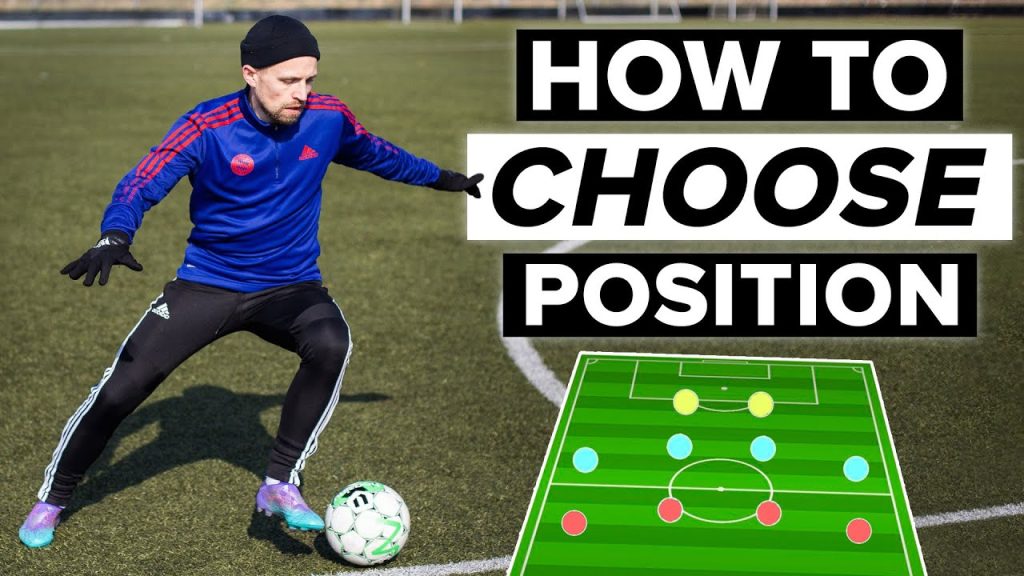Want to know how to tell coaches what positions you play in soccer? Start by being clear and honest about your skills and preferences.
Communicating your position in soccer to a coach is crucial for both you and the team. It helps the coach understand where you fit best and how you can contribute. This not only showcases your strengths but also helps build trust with your coach.
Whether you are new to a team or trying out for a new one, knowing how to articulate your preferred positions effectively can make a significant difference. In this post, we will guide you through the steps to clearly and confidently tell coaches what positions you play in soccer.

Credit: www.youtube.com
Self-assessment
Understanding your own abilities is key to telling coaches about your soccer positions. Self-assessment helps you identify where you excel and areas needing improvement. It provides a clear picture of your strengths and skills, making you more confident in your role on the field.
Identify Your Strengths
Start by listing your soccer strengths. Do you have a powerful kick? Are you fast on the field? Think about the skills that set you apart from others.
- Speed
- Agility
- Accuracy
- Endurance
Ask for feedback from teammates and coaches. They can offer valuable insights. Compare your strengths with the demands of different positions. This helps in finding where you fit best in the team.
Evaluate Your Skills
Next, evaluate your soccer skills. These include both technical and tactical abilities. Technical skills are your ball control, passing, and shooting. Tactical skills involve your understanding of the game and positioning.
- Ball control: Can you keep the ball close?
- Passing: Are your passes accurate?
- Shooting: Do you score goals?
- Positioning: Do you know where to be on the field?
Consider keeping a skills journal. Record your performance in practices and games. This helps you track progress over time. Identify areas to improve and work on them.
By assessing your strengths and skills, you can confidently tell coaches what positions you play. This self-awareness is essential for your growth as a soccer player.

Credit: www.bundesliga.com
Research Team Needs
Researching the team’s needs before telling a coach what positions you play can make a big difference. Understanding the team’s current formation and gaps will help you present your skills effectively. This way, you can show how you fit into their strategy.
Understand Team Formation
First, learn about the team’s formation. Do they use a 4-4-2, 4-3-3, or another setup? Knowing this helps you see where your skills might be most needed. Each formation has different roles and responsibilities. For instance, a 4-4-2 formation relies heavily on strong midfielders and forwards. A 4-3-3 formation needs versatile wingers.
Analyze Team Gaps
Next, look at the team’s current roster. Identify any weak spots or missing positions. Maybe the team lacks a solid defender or a creative midfielder. Highlighting these gaps shows you have done your homework. Coaches appreciate players who understand the team’s needs. It shows you are serious and committed.
By researching team needs, you can better communicate your value. This increases your chances of getting the position you want. It also helps you stand out as a knowledgeable and strategic player.
Effective Communication
Effective communication is key in any sport, especially soccer. Telling your coach what positions you play can impact your game time and team dynamics. It’s important to communicate clearly and effectively to ensure your coach understands your strengths and preferences. This section will guide you on how to do so with ease.
Choosing The Right Time
Timing is crucial. Approach your coach during a calm moment. Avoid busy times like before or after a game. Choose a quiet time during practice or after a training session. This ensures your coach is attentive and can give you proper feedback.
Using Clear Language
Be direct and specific about the positions you play. Use simple terms and avoid jargon. For example, say “I play as a striker” instead of complex phrases. Also, mention any secondary positions you are comfortable with. This helps your coach understand your versatility. Clear communication shows confidence and helps build trust with your coach.

Credit: www.facebook.com
Highlighting Versatility
In soccer, versatility is a valuable trait. Coaches appreciate players who can adapt to different positions on the field. Highlighting your ability to play multiple roles shows your value to the team. It also increases your chances of getting more playing time. Here’s how to effectively communicate your versatility to coaches.
Express Willingness To Adapt
Start by expressing your willingness to adapt to various positions. Mention that you are comfortable playing in different roles. This shows your flexibility and team-first attitude. Coaches value players who can step into multiple roles as needed.
Here’s how you can phrase it:
- “I am open to playing wherever the team needs me.”
- “I have experience in several positions and can adapt quickly.”
- “I enjoy learning and playing different roles.”
Be clear and concise about your willingness to adapt. This will leave a positive impression on your coach.
Showcase Multiple Skills
Next, showcase your multiple skills. Highlight specific skills relevant to various positions. For example:
| Position | Skills |
|---|---|
| Forward | Shooting, Dribbling, Speed |
| Midfielder | Passing, Vision, Stamina |
| Defender | Tackling, Positioning, Strength |
Mention specific games or situations where you used these skills. Coaches appreciate concrete examples. It gives them confidence in your abilities.
Here’s how you can phrase it:
- “As a forward, I scored several goals last season due to my shooting skills.”
- “In midfield, I often create scoring opportunities with my accurate passes.”
- “As a defender, I have stopped many attacks with my strong tackles.”
Highlighting these skills will show coaches your versatility and make you a more valuable player.
Demonstrating Experience
Demonstrating your experience in soccer can set you apart from other players. Coaches want to know what you bring to the team. They need to see your skills and understand your background. This helps them place you in the right position. It’s important to be clear and specific about your past experiences.
Share Past Experiences
When talking to a coach, share your soccer history. Mention the teams you have played for. This shows your commitment to the sport. It also indicates the level you have been playing at. Your history can say a lot about your skills and dedication.
Provide Specific Examples
Go beyond general statements. Provide specific examples of your achievements. Did you score a winning goal in an important match? Have you won any awards or recognitions? These details make your experience more concrete. They help the coach see your potential. Specific examples leave a lasting impression.
Building Coach Relationships
Building strong relationships with your soccer coach can greatly impact your playing experience. Communication is key. This ensures that you and your coach are on the same page. It also helps in understanding each other’s expectations. To correctly tell coaches what positions you play, consider these strategies.
Maintain Open Dialogue
Always be honest and clear about your preferred positions. Share your strengths and the areas where you excel. This helps your coach understand where you can contribute the most. Stay open to their perspective. Your coach might see potential in you for different positions.
Communicate regularly. Let your coach know if you feel comfortable or challenged in your current role. This ongoing conversation helps in making adjustments as needed. Coaches appreciate players who are proactive in discussing their roles.
Seek Constructive Feedback
Ask for feedback on your performance in different positions. This shows your willingness to improve and adapt. Coaches value players who seek to grow. Use their feedback to enhance your skills and understanding of the game.
Feedback sessions can provide insights you might not have considered. Listen carefully and apply their suggestions. This not only improves your game but also strengthens your relationship with your coach. It shows you respect their knowledge and are eager to learn.
Practical Tips
When informing coaches about your soccer positions, clarity and confidence are key. Knowing how to communicate your skills can make a big difference. Here are some practical tips to help you prepare.
Preparing For The Conversation
Know your strengths before you speak to the coach. Identify the positions you excel in and have specific examples ready. Think about moments when you played well in those positions. This preparation will help you speak confidently.
Practice speaking about your positions with friends or family. This can make you feel more comfortable when talking to your coach. Use simple and clear language. Avoid technical terms that may confuse the coach.
Role-playing Scenarios
Role-playing can help you prepare for different questions from the coach. Imagine the coach asking about your experience in a specific position. Practice your response. Keep your answers short and focused on your skills.
You can also role-play with a teammate. Have them ask questions a coach might ask. This can help you think on your feet. It can also build your confidence for the real conversation.
Remember, the goal is to show the coach your understanding of the game. Be honest about your abilities. Clear communication can lead to better opportunities on the field.
Frequently Asked Questions
How To Tell Coaches My Soccer Positions?
Clearly state your primary and secondary positions. Mention any versatile roles you can play. Be honest about your strengths.
Why Is It Important To Communicate Soccer Positions?
Coaches need to know your positions to utilize your skills effectively. It helps in team formation and strategy planning.
What Details Should I Include About My Soccer Positions?
Include your preferred positions, experience level, and any notable achievements. Mention any flexibility to play multiple positions.
When Should I Inform Coaches About My Soccer Positions?
Inform coaches at the beginning of tryouts or training sessions. Early communication helps them make informed decisions.
Conclusion
Clearly communicating your soccer position helps coaches understand your strengths. Mention specific roles and responsibilities you excel in. Use simple language and stay confident. This shows your dedication and readiness. Always be honest about your skills and experience. This approach builds trust and opens opportunities.
Remember, clear and effective communication is key.


